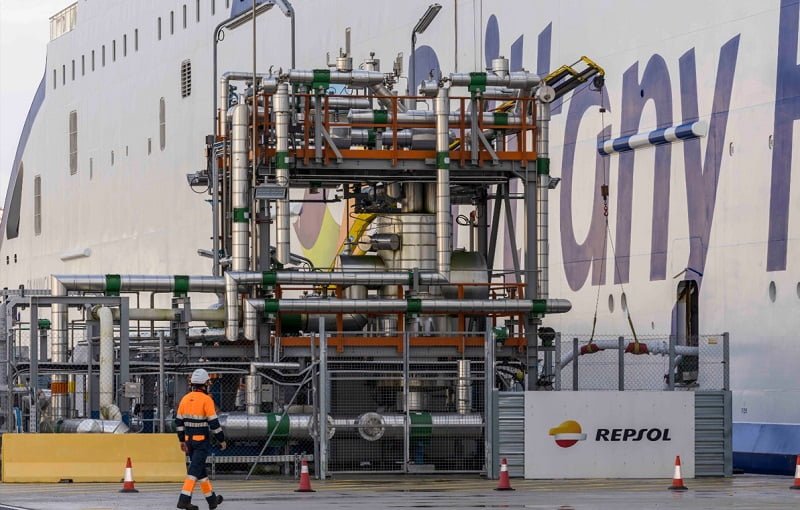Repsol, a global multi-energy company, has reached a major milestone by supplying bio-LNG to Brittany Ferries‘ LNG-powered vessels for the first time in Spain. This significant collaboration underscores both companies’ strong commitment to sustainability and decarbonization in the maritime industry.
The supply marks the first test of its kind between the two companies, involving three truck-loads of bio-LNG, totaling 60 tons, to power Brittany Ferries’ Salamanca and Santoña vessels. These vessels operate routes connecting Portsmouth to Santander and Bilbao in northern Spain, and Cherbourg in western France, as well as Rosslare, Ireland to Bilbao and Cherbourg.
Table of Contents
A Renewable Push for Decarbonization
This partnership between Repsol and Brittany Ferries emphasizes their shared vision for advancing the use of renewable fuels within the shipping sector. The bio-LNG Bunkering supplied by Repsol is expected to contribute to significant emission reductions, cutting CO2 equivalent emissions by over 100% compared to traditional LNG, depending on the biomethane’s feedstock. Bio-LNG’s chemical composition mirrors that of conventional LNG, making it compatible with existing engines while maintaining vessel performance.
The bio-LNG used in this trial was produced at Spain’s first dedicated bio-LNG facility located in As Somozas, Galicia. This facility utilizes waste from the agri-food industry, agriculture, and households, as well as sewage plant sludge to produce renewable fuel, showcasing how waste can be converted into sustainable energy solutions.
Commenting on the trial, Bertrand Crispils, head of energy transition at Brittany Ferries, stated, “This test is the next significant step on Brittany Ferries’ journey to a more sustainable future. The first three truck-loads of bio-LNG mark the start of Brittany Ferries progressively replacing fossil fuels with greener alternatives. By combining biofuels with other innovations, such as electrification and efficient hydrodynamics, we are fully mobilizing in the fight to cut greenhouse gas emissions.”
Carlos Martin Iglesias, LNG bunker trader at Repsol, added, “With these first supplies of bio-LNG, we are offering the maritime sector another option for reducing CO2 emissions. This trial is proof of Repsol’s commitment to the energy transition and providing alternative energy solutions to help our customers advance in their decarbonization processes.”
A Greener Fleet for Brittany Ferries
Brittany Ferries has made significant investments to modernize its fleet and improve its sustainability profile. Since 2019, the company has committed to bringing five new vessels into service by 2025, four of which are powered by LNG. The Salamanca and Santoña are part of this modern fleet. Two LNG-electric hybrid vessels are currently under construction and expected to enter service by spring 2025. These hybrids will further reduce emissions by combining LNG propulsion with electric power.

Repsol’s Leadership in Renewable Fuels
Repsol, a leader in the production and supply of renewable fuels, continues to advance its decarbonization strategy. Renewable fuels, including bio-LNG, are key pillars of the company’s efforts to reduce emissions across all transportation sectors. The energy giant plans to increase its production capacity for renewable fuels, aiming to reach between 1.5 and 1.7 million tons by 2027, and up to 2.7 million tons by 2030. The company recently inaugurated a new advanced biofuels plant in Cartagena, with an annual production capacity of 250,000 tons, solidifying its role at the forefront of renewable fuels production in Europe.
About Repsol
Repsol is a global multi-energy company that serves a wide range of energy needs for customers worldwide. The company employs 25,000 people across more than twenty countries and serves 24 million customers. Repsol’s extensive service station network of 4,500 locations spans Spain, Portugal, Peru, and Mexico, offering a mix of traditional and alternative fuels, including 100% renewable options, electric recharge stations, AutoGas, and natural gas for vehicles.
Repsol is also a leading electricity retailer in Spain and operates a diversified renewable generation portfolio with an installed capacity of 3,100 MW in Spain, the United States, and Chile. The company produces an average of 589,000 barrels of oil per day and is renowned for its efficient refining operations. Repsol is actively transforming its industrial complexes in the Iberian Peninsula into multi-energy hubs capable of producing low-carbon products, including renewable fuels, in its push to achieve net-zero emissions by 2050.
About Brittany Ferries
Founded in 1972, Brittany Ferries began as a freight-only ferry service, with its first voyage transporting cauliflowers and cognac between Roscoff, France, and Plymouth, UK. Over the past 50 years, the company has expanded its services, connecting the UK, France, Spain, and Ireland, and creating vital sea routes across the Atlantic Arc. Brittany Ferries’ commitment to reducing congestion and emissions from road transportation has also fostered economic growth in local communities through job creation, tourism, and cross-border trade.
Source Brittany Ferries

